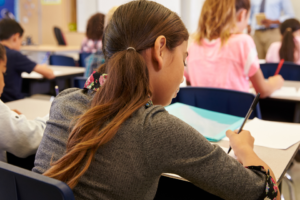
Everything You Need to Know About Learning Disabilities

We hear the phrase “learning disabilities” (LDs) constantly in today’s schools. But do we truly understand them and how to best serve students who struggle with these disorders? I would suggest that, often, LDs are subject to a lot of hearsay and myth, and that this does a disservice to students who truly need help in dealing with them. Support, accommodations, and a deep understanding of what it means to have a learning disability are vitally important in supporting our students. To that end, we need to keep some things in mind:
There is No Catch-All Definition
Today, we are all diagnosticians. We easily guess that this student has ADD or that one, a processing issue. It is, however, dangerous to bandy these terms about without deep understanding of their implications. Tempting as it is to categorize every student who struggles, we must remember that there is no single definition of a learning disability, and that they take different forms and manifest themselves differently in different students. One child may, for instance, be unable to sit still or stop fidgeting during class while another may appear outwardly clam and regulated but be struggling mightily with processing the information before him. The point is that we should not paint with a broad brush when working with students. Awareness and understanding of LDs is great, but so is understanding of different students and their own individual struggles.
They’re Not Always Obvious
As mentioned above, the apparently calm and focused student in the classroom is not necessarily immune to a LD. Internal issues with processing and calculations or other disorders like dyslexia that do not appear outwardly obvious are still significant learning obstacles. It takes more than a quick look at a student’s demeanor or behavior to know what’s really happening inside. At the same time that we can’t assume all kids are suffering from learning disabilities, we also can’t assume that none of them are, regardless of what we observe. Fostering a deeper understanding of the challenges encountered by today’s students will help us to avoid making damaging assumptions about students.
Support, Not Labeling, Is Vital
People are often overwhelmed by diagnostic labels. “I have ADD,” for instance, is a statement we hear from a lot of students. But do we consider what this may mean to that student in terms of his day-to-day life? It often happens that people “live out” their diagnoses: that is, the ADD student may come to expect a struggle and to chalk problems up to his ADD diagnosis. This is not to suggest in any way, shape, or form that these diagnoses are not real, but rather that less focus on the label and more on the intervention is important. Instead of putting the attention on the name of the disorder, we can strive to work with the student and offer support so that he does not feel he is the “poster boy of ADD,” being constantly stalked by his disorder. This can often be a case of “perception becoming reality:” the more we iterate the disorder to the student, the more he begins to feel defined by it which can lead to feelings of failure and self-doubt, not to mention academic struggles. He is, above all, a student who deserves to learn in a way that works for him and to not be defined by diagnostic labels. Sensitivity and empathy go a long way.
Diagnosis Does Not Mean Failure
The diagnosis of a LD can be tough news for the student as well as his family, but it’s important to know that a diagnosis does not equal imminent failure. In fact, learning disabilities are better understood by schools, teachers, administrators, health professionals, coaches, and tutors than they have ever been before. The educational team members and professionals in your student’s life are likely well-versed in the language and treatment of LDs, and this can provide needed support for the struggling student. Not giving up the ship because of an LD is key in remaining a lifelong learner despite obstacles.
Help is Out There
Twenty years ago, there were no Individualized Education Plans (IEPs) available for students with LDs. Today, however, schools provide numerous resources for students who learn differently. Differentiated instruction allows kids access to the learning in the least-restrictive classroom environment. IEPs and 504 plans allows schools and teachers to tailor lessons in such a way that they work best for students with LDs. Guidance offices are equipped to understand LDs and formulate plans to ensure that students are successful despite academic challenges. Tutoring companies have added to their teams educational experts and psychologists to bring another layer of support to a situation that can often feel overwhelming. All in all, students with LDs are better supported today than even before. Always remember that help is out there.
Learning disabilities, simply put, do not signal disaster. However, a heartfelt and profound understanding of students’ struggles can put us in position to help them find success even in the face of a learning disability.
Written by Phil Lane
Contact us today to learn more about how our Psychologist, Dr. Guada, can help your child!



